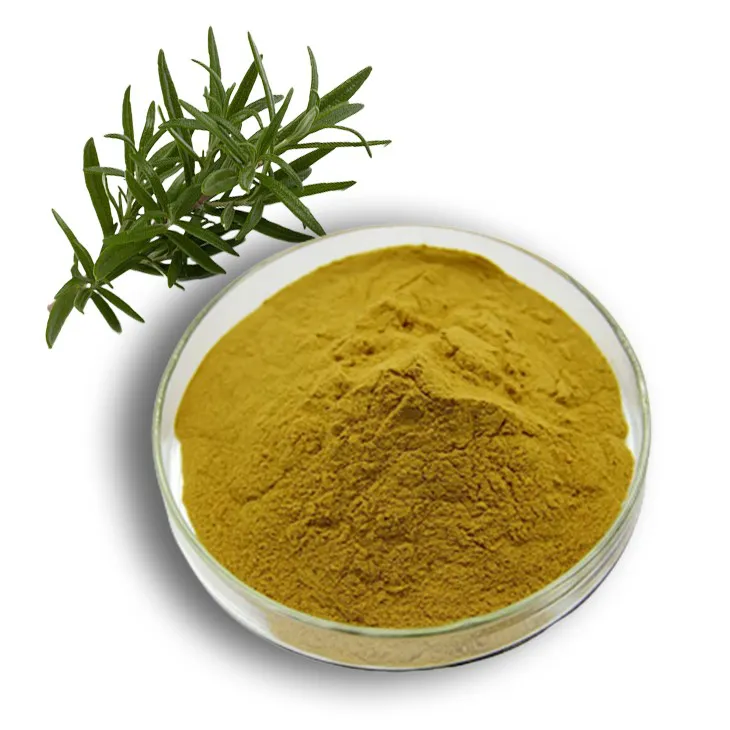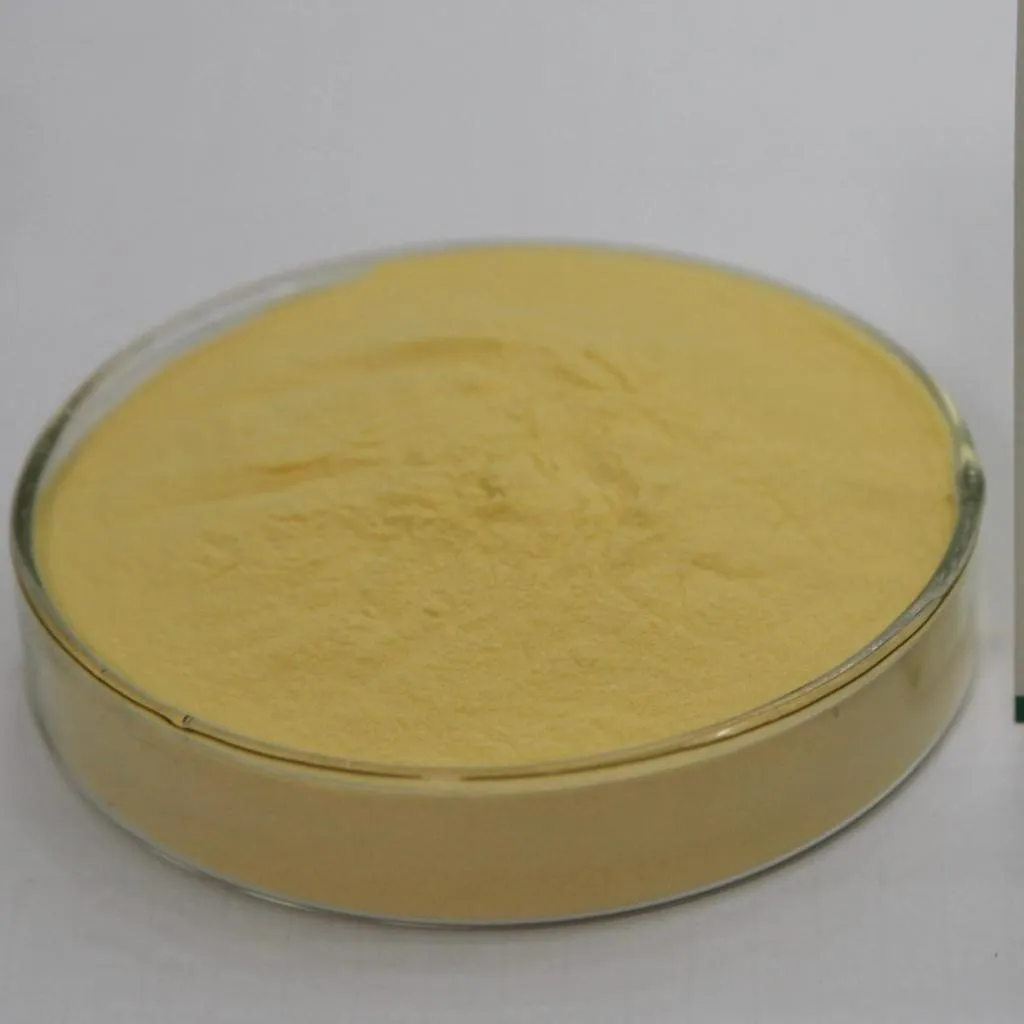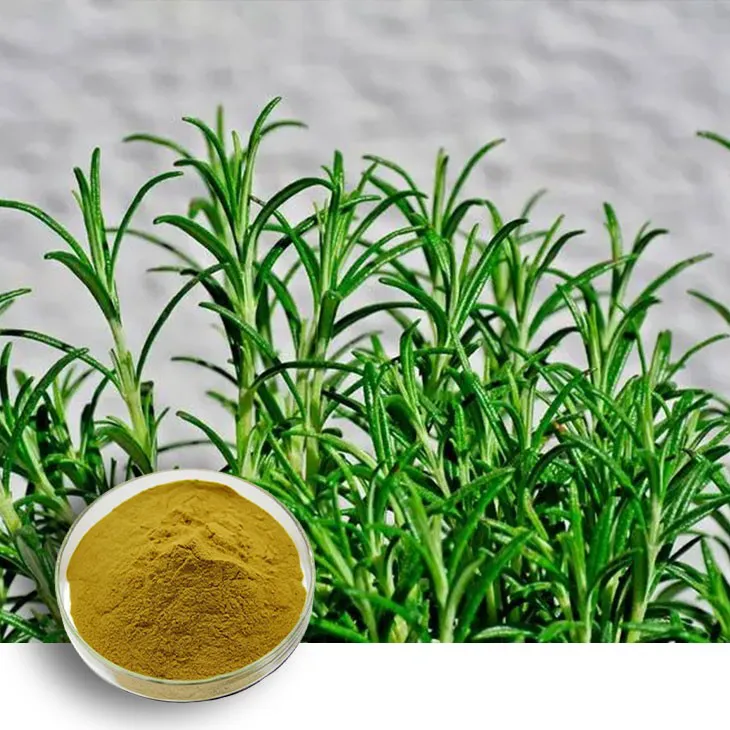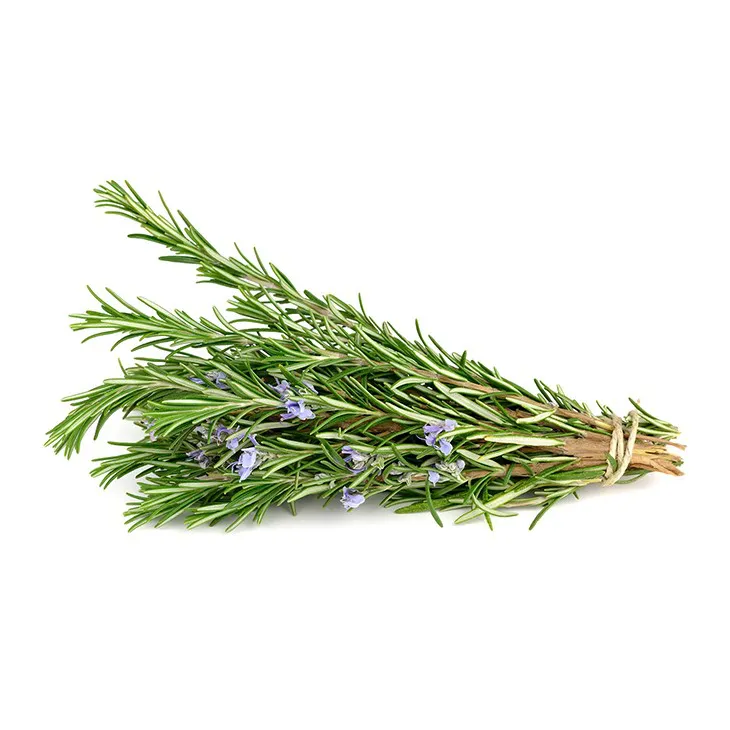- 0086-571-85302990
- sales@greenskybio.com
Five Reasons for Using Rosemary Extract in the Food Industry.
2024-12-13

1. Antioxidant Properties
Rosemary extract is highly regarded in the food industry for its antioxidant capabilities. Oxidation is a major concern in food preservation, particularly for products that are rich in fats. When fats oxidize, they can develop off - flavors, rancidity, and a decrease in nutritional value. This process can significantly shorten the shelf - life of food products.
The antioxidant components in Rosemary extract, such as carnosic acid and carnosol, work by scavenging free radicals. Free radicals are highly reactive molecules that are formed during normal metabolic processes in the body as well as during food processing and storage. These free radicals can initiate a chain reaction of oxidation in fats, oils, and other food components. By neutralizing these free radicals, Rosemary extract helps to prevent or slow down the oxidation process.
For example, in the case of nuts and seeds, which are high - in - fat foods, the addition of rosemary extract can extend their shelf - life. Nuts are prone to developing a stale or rancid taste over time due to oxidation. However, when rosemary extract is added during the processing or packaging stage, it can protect the fats in the nuts from oxidation for a longer period. This not only maintains the quality of the nuts but also reduces food waste, which is an important consideration in today's sustainable food production environment.
In meat products, especially those that contain a significant amount of fat, such as sausages and bacon, rosemary extract can also play a crucial role. It helps to prevent the fat from oxidizing, which can lead to discoloration (such as the development of a yellowish or brownish tinge) and off - odors. This is beneficial for both the aesthetic appeal and the overall quality of the meat products, ensuring that they remain fresh - looking and tasting for a longer time.

2. Flavor - Enhancing Property
Another significant reason for the use of rosemary extract in the food industry is its flavor - enhancing property. Rosemary has a distinct and pleasant aroma that can add depth and complexity to a wide variety of food items.
In baked goods, such as bread and pastries, a small amount of rosemary extract can impart a subtle, earthy flavor that complements the other ingredients. It can enhance the overall flavor profile, making the baked goods more appealing to consumers. For example, in a rustic whole - wheat bread, the addition of rosemary extract can give it a unique and inviting taste, differentiating it from ordinary bread.
In savory dishes, rosemary extract is even more versatile. It can be used in soups, stews, and sauces to add a fragrant and herby note. In Italian cuisine, for instance, rosemary is a classic herb used in tomato - based sauces. The extract can provide a concentrated form of this flavor, allowing for more precise control in recipe formulation. In a rich beef stew, a touch of rosemary extract can enhance the meaty flavor and add a pleasant herbal undertone.
In the production of seasonings and spice blends, rosemary extract is also a valuable ingredient. It can be combined with other herbs and spices, such as thyme, oregano, and garlic powder, to create unique and flavorful blends. These blends can be used in a wide range of applications, from marinating meats to seasoning vegetables.

3. Antimicrobial Activity
Antimicrobial activity is a key advantage of rosemary extract in the food industry. Foodborne illnesses are a major concern, and the presence of harmful microorganisms in food can lead to spoilage, as well as pose a risk to consumer health.
Rosemary extract contains compounds that have been shown to inhibit the growth of various bacteria, yeasts, and molds. For bacteria, it can disrupt their cell membranes and interfere with their metabolic processes. This inhibitory effect can help to keep food free from bacterial contamination, which is especially important for perishable foods such as dairy products, fresh fruits, and vegetables.
In the case of dairy products, such as cheese and yogurt, the addition of rosemary extract can prevent the growth of spoilage - causing bacteria. For example, Listeria monocytogenes is a pathogen that can contaminate dairy products. Rosemary extract has been studied for its potential to inhibit the growth of this bacterium, thereby enhancing the safety and shelf - life of dairy products.
For fresh fruits and vegetables, rosemary extract can be used as a natural preservative to prevent the growth of mold. Mold growth can cause fruits and vegetables to rot quickly, leading to significant losses in the supply chain. By applying a solution containing rosemary extract, it is possible to extend the freshness of these perishable items, reducing waste and ensuring that more of the produce reaches consumers in a fresh and edible state.

4. Maintaining Food Color
The ability of rosemary extract to maintain the integrity of food color is of great importance in the food industry. Color is one of the first visual cues that consumers use to assess the quality and freshness of food.
In processed meats, such as ham and deli - sliced meats, color is crucial. These meats are often expected to have a bright, appealing color. However, during storage and processing, factors such as oxidation and microbial growth can cause discoloration. Rosemary extract can help to prevent this. By inhibiting oxidation and the growth of spoilage - causing microorganisms, it helps to keep the meat looking fresh and appetizing. For example, in smoked ham, rosemary extract can help to maintain the characteristic pinkish - red color for a longer period, enhancing its visual appeal on the store shelf.
In the case of fruit - based products, such as fruit juices and jams, color retention is also important. Fruits are known for their vibrant colors, which are due to the presence of natural pigments such as anthocyanins. However, these pigments can be degraded during processing and storage. Rosemary extract can act as a protector of these pigments, helping to maintain the bright and attractive colors of the fruit products. This is not only aesthetically pleasing but also gives consumers the impression that the product is of high quality and fresh.
In vegetable - based products, like canned or frozen vegetables, rosemary extract can also play a role in color preservation. For instance, green vegetables can turn a dull color over time due to various chemical and enzymatic reactions. The addition of rosemary extract can slow down these processes, keeping the vegetables looking green and fresh.

5. Natural Solution for Food Manufacturers
In line with the current market trend towards naturalness, rosemary extract offers a natural solution for food manufacturers. Consumers today are increasingly conscious of the ingredients in their food and are more likely to choose products that contain natural additives over synthetic ones.
For food companies, using rosemary extract allows them to meet consumer demands for natural products while still achieving the necessary functional benefits in food preservation, flavor enhancement, and quality control. It can be used as a substitute for some synthetic antioxidants, antimicrobial agents, and flavor enhancers, which may have a negative perception among consumers.
Moreover, rosemary is a well - known and widely accepted herb. Its use in food products can be easily communicated to consumers, who are likely to view it as a familiar and natural ingredient. This can be a marketing advantage for food manufacturers, as they can highlight the use of rosemary extract in their product labels, appealing to consumers who are seeking natural and clean - label products.
In addition, from a regulatory perspective, rosemary extract is generally recognized as safe (GRAS) in many countries. This means that food manufacturers can use it without facing significant regulatory hurdles, making it an attractive option for those looking to innovate in the food industry while still complying with food safety regulations.
FAQ:
Question 1: How does rosemary extract act as an antioxidant in the food industry?
Rosemary extract contains compounds that can prevent the oxidation of food components. Oxidation can cause spoilage, especially in fatty foods. The antioxidants in rosemary extract scavenge free radicals, which are molecules that can initiate the oxidation process. By doing so, they protect the fats, oils, and other components in food from turning rancid or losing their quality over time.
Question 2: In what types of food can rosemary extract enhance the flavor?
Rosemary extract can enhance the flavor in a wide variety of foods. It works well in meat products, adding a pleasant and characteristic aroma. It can also enhance the flavor of baked goods like bread and pastries. In addition, it is suitable for use in some dairy products, such as cheese, where it can contribute to a more complex and appetizing flavor profile. Vegetable - based dishes can also benefit from the addition of rosemary extract.
Question 3: How effective is rosemary extract's antimicrobial activity in food?
Rosemary extract has significant antimicrobial activity. It can inhibit the growth of various harmful microorganisms in food. It contains substances that can disrupt the cell membranes of bacteria, yeasts, and molds, thereby preventing their proliferation. This helps in extending the shelf - life of food and reducing the risk of foodborne illnesses. However, the effectiveness can vary depending on factors such as the concentration of the extract used, the type of microorganism, and the food matrix.
Question 4: Why is maintaining food color important, and how does rosemary extract contribute?
Maintaining food color is important because it is a key factor in consumer acceptance. Consumers often associate certain colors with the freshness and quality of food. Rosemary extract can help maintain food color by preventing oxidation processes that can cause color fading or discoloration. For example, in fruits and vegetables, it can slow down the browning process. In processed foods, it can keep the color stable during storage and distribution.
Question 5: How does rosemary extract fit into the trend towards naturalness in the food industry?
Rosemary extract offers a natural alternative for food manufacturers in line with the trend towards naturalness. As a natural extract, it is derived from the rosemary plant. Consumers are increasingly looking for products with natural ingredients, and rosemary extract meets this demand. It can replace synthetic additives in many cases, providing similar or even better functionality while being a more natural and consumer - friendly option.
Related literature
- The Role of Rosemary Extract in Food Preservation"
- "Rosemary Extract: A Natural Flavor and Antioxidant in the Food Industry"
- "Antimicrobial and Color - Preserving Effects of Rosemary Extract in Food"
- ▶ Hesperidin
- ▶ Citrus Bioflavonoids
- ▶ Plant Extract
- ▶ lycopene
- ▶ Diosmin
- ▶ Grape seed extract
- ▶ Sea buckthorn Juice Powder
- ▶ Fruit Juice Powder
- ▶ Hops Extract
- ▶ Artichoke Extract
- ▶ Mushroom extract
- ▶ Astaxanthin
- ▶ Green Tea Extract
- ▶ Curcumin
- ▶ Horse Chestnut Extract
- ▶ Other Product
- ▶ Boswellia Serrata Extract
- ▶ Resveratrol
- ▶ Marigold Extract
- ▶ Grape Leaf Extract
- ▶ New Product
- ▶ Aminolevulinic acid
- ▶ Cranberry Extract
- ▶ Red Yeast Rice
- ▶ Red Wine Extract
-
melatonin extract
2024-12-13
-
Nettle leaf extract
2024-12-13
-
Honeysuckle Pollen
2024-12-13
-
Diosmin
2024-12-13
-
Beetroot juice Powder
2024-12-13
-
Saponin Extract
2024-12-13
-
Jujube Extract
2024-12-13
-
Apricot Powder
2024-12-13
-
Yellow Pine Extract
2024-12-13
-
Pueraria Lobata Extract
2024-12-13





















